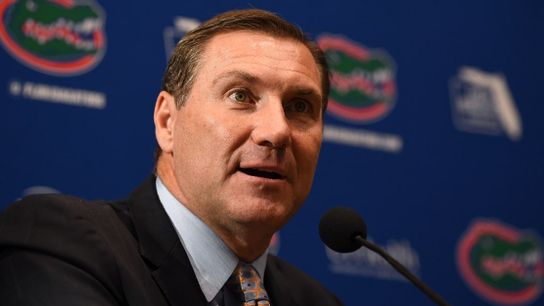With each passing day, it seems the calls to pay college athletes gets a little bit louder. The money in big-time college sports has never been bigger, and though scholarship athletes' benefits have grown in recent years, their salary has not. It's still at zero.
Speaking at an alumni event in Gainesville on Tuesday night, new Florida head coach Dan Mullen fielded a question about paying players.
“They get an awful lot of benefits already. They get a full scholarship to come to the University of Florida if they’re on the team. They get cost of attendance. They get room, board, tuition, books, fees and cost of attendance to come here. If they [became] employees of the university, to go pay the players, those all become taxable benefits according to the IRS. So you get into massive tax code questions,” Mullen said. “Everybody wants to [say], ‘Pay the players.’ Get into the legal side of that before you jump up and say, ‘Let’s go pay the players.’ … Because none of these guys could afford to pay the taxes on taxable benefits," Mullen told SEC Country.
“They get tutoring. Does that now became a taxable benefit because they’re a paid employee of the university? I’m a paid employee of the university. I get parking. That’s a taxable benefit. I have to pay taxes on my parking sticker. Anything I do, if I get a ticket to a game, that’s a taxable benefit. I have to pay taxes on the value of that ticket. Their scholarship would become that way. So the amount of money you’d have to pay them, if you paid them a certain amount, they’d have to get that much money, you’d have to pay them even more just to pay for the value of their scholarship.”
Of course, the straight salaried plan is not the most popular pay-the-players idea out there. In addition to tax issues, schools would have to wade through the Title IX barbed wire if, for instance, the football team netted a different salary than the softball team.
This is why the so-called Olympic model has gained traction, where athletes would be free to trade on their image and likeness for money that wouldn't come out of the athletics department's coffers. They would still be scholarship athletes -- removing the tax and Title IX issues -- but could capitalize on whatever market there was for them, such that one exists.
“I think it could cause a lot of dissension among teams because I do think players would realize their values might not be quite as much as they think they are, as far the marketing themselves value,” Mullen said.
For what it's worth, here's what NCAA president Mark Emmert had to say on the Olympic model earlier this month: "There’s a lot of discussion about the Olympic model and think it’s well deserving of serious consideration inside the context of college sports."
